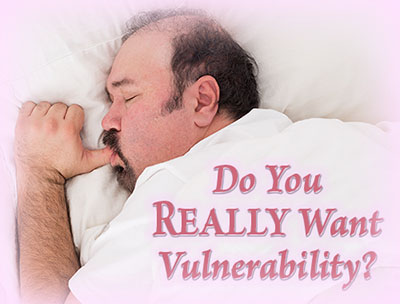

by
D. Patrick MillerYears ago, while attending a relationship workshop taught by psychologist and spiritual teacher Patricia Sun, I witnessed an exchange I will never forget.
During a Q&A session, a woman spoke up and said, “I wish my husband could be more vulnerable. I just want to know what he really feels.”
Patricia answered bluntly: “Oh no you don’t.”
Taken aback, the questioner responded meekly, “What do you mean?”
“If there’s something you don’t already know about what your husband feels,” Patricia explained, “that means he’s keeping some feelings from you. And, there’s probably a good reason. That is, you might be horrified by what those feelings are. In fact, what you probably want to know is that he feels only what you want him to be feeling.”
I think about this exchange whenever I hear the idea of vulnerability touted as a psychological or spiritual ideal. This ideal has long had a trendy cachet. I recall a full-page Eileen Fisher ad in the New Yorker entitled “Power. In the Words of Women,” which featured Colleen Saidman, author of Yoga for Life, proclaiming:
“Power means having the courage to be yourself. Power is also having the courage to be vulnerable, to show up without your armor.”
Really? If we revisit the Oxford English definition of vulnerable, it’s pretty challenging to see any connection of this quality to power:
vul·ner·a·ble: adjective
1. susceptible to physical or emotional attack or harmTo all those who blithely assume vulnerability to be some kind of sweet and harmless openness — to which we can kindly respond with an “aw shucks” tenderness — it’s important to remember that vulnerability can cut both ways.
That is, someone who’s vulnerable enough to respond to your request to share his or her real feelings may make you feel vulnerable. You may want to run and hide, recoil in disgust, file a restraining order, or simply wonder how you ever got the crazy idea that you really wanted to hear this other person’s authentic, heartfelt, and deeply twisted feelings.
If someone volunteers vulnerability without being asked, it’s even worse. Do we really want to hear out the true, unsolicited feelings of the narcissist or sociopath, unless we’re a clinician or psychotherapist trained to deal with those feelings?
There is, however, a powerful way in which we can express or witness vulnerability.
It begins with acceptance of the notion “Nothing human is alien to me,” as the Roman dramatist Terence put it. That means we can acknowledge whatever another person might truly feel and admit — be it selfishness, lust, manipulativeness, passivity, passive-aggressiveness, or outright savagery — and likewise admit we’ve been there, felt that, and found it forgivable.
Hence, the potential power of a useful vulnerability actually lies in forgiveness. But forgiving is not the same as approving of everything that’s within the human capacity to feel or express. And it certainly doesn’t mean simply “showing up without your armor.”
Forgiveness is the key to power because it’s a state of mind in which we can witness anything without feeling “susceptible to harm.” When nothing can offend, disturb, or threaten our equanimity — because we have, in a very real sense, forgiven everything human in advance — then we are truly powerful.
When I studied the martial art of aikido, I remember being taught the wisdom of its founder Morihei Ueshiba, who said that the highest expression of the power of aikido was not being able to win any tests or trials. Instead, true mastery would be demonstrated by the capacity to enter a room and quell any conflict there merely by one’s presence. While years of study of this art’s techniques would be necessary to achieve such presence, the techniques would be unnecessary once it was achieved.
As Wikipedia puts it, “Ueshiba's goal was to create an art that practitioners could use to defend themselves while also protecting their attackers from injury. Aikido is often translated as 'the way of unifying (with) life energy' or as ‘the way of harmonious spirit.' According to the founder's philosophy, the primary goal in the practice of aikido is to overcome oneself instead of cultivating violence or aggressiveness.”
In this regard, it’s important to remember that the techniques of aikido are entirely defensive. The practitioner never attacks, but only receives attacks with the intention of bringing the attacker back into balance – because it’s assumed that an attacker is inherently unbalanced. “Balance” may mean being laid out on the floor, unable or unwilling to attack again… but you get the idea.
The true expression of vulnerability relies on the skill of “overcoming oneself,” as opposed to just letting one’s worst traits or feelings hang out there. It stems from learning to identify with the energy within us that’s invisible, timeless, infinite, and whole: “the way of the harmonious spirit.”
When we identify only with the shaky, fractured ego and the time-limited body, we will feel vulnerable all the time — but only in the worst ways — because the ego and the body suffer constant threats.
To constantly remind ourselves that we are far beyond what we appear to be is a demanding, moment-by-moment discipline.
But I wouldn’t want to be vulnerable without it.
HOME • BOOKS • FEATURES • STAY IN TOUCH